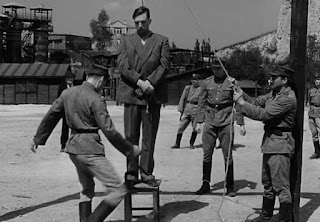SALÒ, OR THE 120 DAYS OF SODOM Metro-Goldwyn-Mayer
Metro-Goldwyn-Mayer | Release Date: January 10, 1976
Starring: Paolo Bonacelli, Giorgio Cataldi, Uberto Paolo, Quintavalle
Director: Pier Paolo Pasolini
Genre(s): Art Horror
Runtime: 1h 57m
Summary: A group of fascists round up nine adolescent boys and girls and subject them to a 120 days of physical, mental, and sexual torture.
Review: I’m not going to pontificate and dig too deep here, as there have been dozens of studies, reviews, and serious discussions surrounding this notorious 1976 film, and I couldn’t add much more to what has been unearthed since. What I can reflect on is my experience, which was, to be fair, rattled.
Sure, I’ve been on an extreme cinema kick lately so this shouldn’t have had such an impact after films like High Tension and A Serbian Film. And I’ve been thinking back on it over the past couple of days to try out my finger on it, with mixed results.
For one thing, I’ve always found films from the 70’s to be drastically realistic, raw, and honest. Whether it be Straw Dogs or A Clockwork Orange or The Exorcist, everything from the film stock to the performances to the lighting all make it a very real experience. And when we take the situations in Salò into account, reality is terrifying.
Of course, there are a number of triggers here that a modern audience would shut down in a golden minute, not least the age of the young people being repeatedly defiled throughout. Ordinarily, this wouldn’t be a big hurdle for me if handled correctly, but man, the level of extremity on display here is intense, especially when they focus on the eyes of the characters.
If you have hang-ups, I guarantee that they’re going to get pushed somewhere in this movie. Sodomy, torture, eating of human faeces, cruelty without boundaries, and so, so much more - it’s an artistic portrait of the human condition that bears watching once to experience, but it will leave its mark thereafter.
The final twenty minutes or so is just so over the top and brutal that it left me spent and mentally sensitive, and I think that’s a testament to the mastery of Pasolini and what he achieved with this visual moral litmus test. It was a lot to absorb and digest, with a number of taboos that one has to leave at the door to continue.
But continue I did and I’m glad as there is a lot to gleam from the purpose of the film, one that sought to break down barriers and add a visual bombardment to a literary tome.
I am pretty certain that I’ll never feel the need to watch it again, but it was an experience that I’ll never forget.
This is one of the earliest examples of truly extreme cinema, and it remains a high water mark rarely equalled.
Rating: 7/10











Comments
Post a Comment